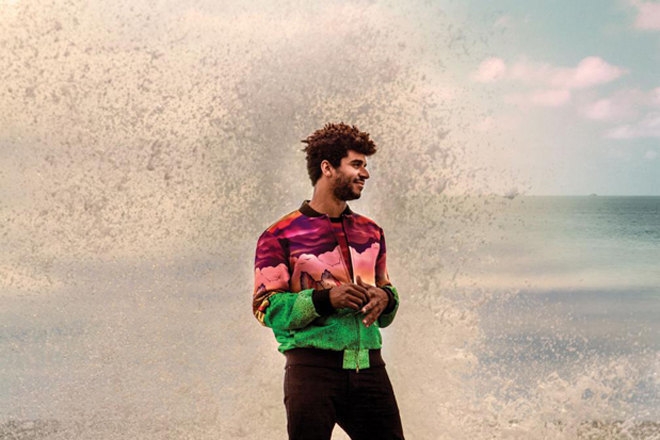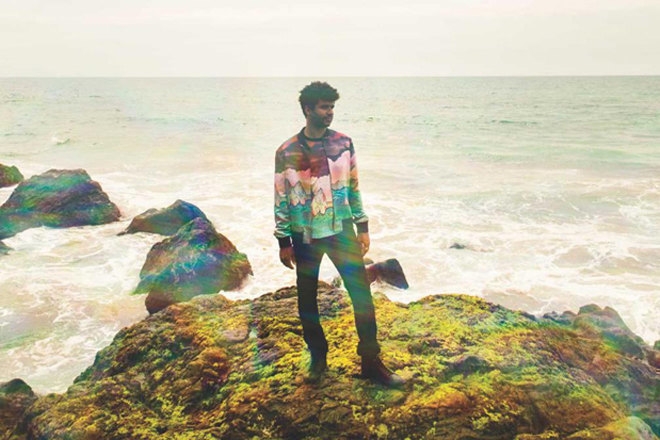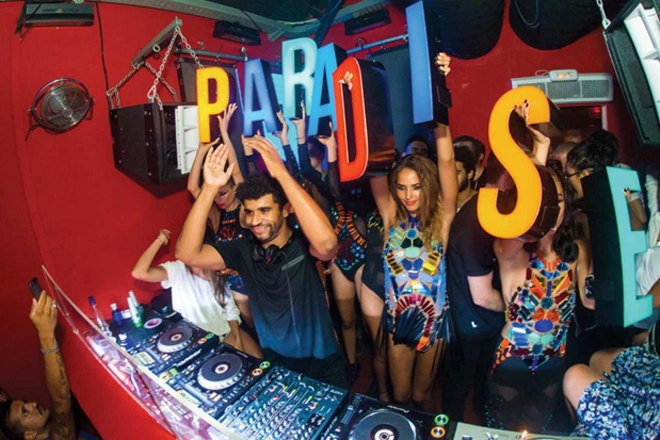Cover Feature: Jamie Jones
The UK's biggest house DJ

The UK’s biggest house DJ, Jamie Jones is also the man behind one of our greatest labels, a nurturer of talent, a sometime pop star and one of the keepers of Ibiza’s sacred flame. As the island gets set to kick off another season, who better to welcome us to Paradise…
Pinning down Jamie Jones can be difficult. When Mixmag meets him at the Ace Hotel in London for poached eggs on a Friday morning, he’s on a rare trip to the UK from his LA base. After his most successful Miami conference to date (his sets at Ultra and his own party at Mana Wynwood still being talked about) he has two days in London to regroup before Time Warp in Germany. From Miami and Mannheim to Tulum and back to his spiritual home of Ibiza, Jamie Jones is arguably the biggest British house DJ in the world.
The surroundings are a little different from his early days in the Capital, when he was a frequent weekend visitor without a place to stay. After partying on Sundays at The Cross he would sleep in the corridor of the Holiday Inn. “A lot of people are good at music but aren’t hustlers,” he smiles. “I’ve always been a hustler. Even when I was at school doing my A levels, I would take bread, jam and butter in the lunch break and make twenty quid selling toast. I also did medical trials after uni. There was a huge scare at one hospital where people’s heads swelled up and turned black. It was in all the papers. Mum freaked out.”
Maybe it’s the time spent struggling that means despite his success, Jamie Jones’ head has never been in danger of swelling. The Jamie his real friends know is not only shy and self-effacing, but also super-loyal – to the point that he works with many friends he came up with: from Richy Ahmed and Lee Foss (co-owner of Hot Creations) through to Seth Troxler and Mark Jenkyns (whose music makes a mark on Jamie’s mix for Mixmag). Many others, like Patrick Topping, credit Jones not just with their big break, but constant support since. Ahmed met Jones back in 2003. Richie originally joined Hot Creations as their A&R man but Jamie “saw talent and pushed me. He’s always been really supportive.” That support and synergy extends to Dionne, Jones day-to-day assistant in the wider electronic world. The pair met in San An back in 2000 at a formative time of Jamie Jones’ life “I’d be lost without her,’ he says.
And while Jones’ success has been based on so many things (excellent timing, amazing records/remixes, a dedication to DC10 and Paradise, the runaway success of Hot Natured and of course his own club-defining Hot Creations imprint), the thing it always comes back to is that search for the perfect synth (and bassline). He’s a tastemaker as much as a music- and mischief-maker, but in the end, it’s about music and passion.
A list of his must-have productions would surely include game-changing single ‘Summertime’, ‘Moan & Groan’, ‘Planets, Spaceships’ with Digitaria, and Circo Loco-slaying remixes of ‘Hungry For The Power’ by Azari & III and ‘Tourist Trap’ by 11:11. A week after we meet, Jamie is on stage with Hot Natured at Coachella, the US’s answer to Glasto. A week before, he slew the CRSSD festival in San Diego with a B2B with Seth Troxler. Did we mention that Jamie Jones has broken the US too?
Jamie’s story actually starts in North Wales. Born in 1980 in Southampton, a year later he and his mum moved to the small village of Caernarfon in Wales (“I was the only black kid for miles around” he told us in 2007). He was a happy child; a gifted footballer and one of the top students in his class – but he knew from an early age he wanted to be involved in music. In his teens he learnt to produce on a PlayStation game, hoarded rave/hardcore cassettes, bought his first set of cheap turntables and listened to Pete Tong’s Essential Selection religiously in his room.
But it was the years just after the Millennium, when from the outside dance music seemed to be in a period of crisis and recession, that shaped Jamie Jones. And his way in was through clubbing and partying, Ibiza’s early-2000s freak show that would prove to be Jones’ ultimate spiritual home. He first went to the White Isle as a worker at the tender age of 19, meeting like-minded producers and party people. “There was a London connection too, but every single person I knew was in Ibiza,” he says. “From twenty to twenty-five is the age when you make some of your best friends for life. It’s the time that you learn and change the most as a person. Those were my heaviest party years. It’s when I came into myself as a person.”
In Ibiza he met people like Manumission booker Rosanna Maldonado, Circo Loco veteran Clive Henry (arguably Jamies’ first underground role model) and several pioneering UK promoters. “There was a period when music was a bit stale in Ibiza,” he recalls. “By 2003 the Space terrace era had come to an end. We had been going to DC10 for a few years at 7am on Monday, then going to the Manumission Motel or having a few afterhours things at Ancient People in Playa d’En Bossa. I became friendly with the older promoters and DJs who run the clubs.”
The next step came courtesy of the two big M’s: Ministry and Manumission. On Ministry he started on stand-by: “My first gig was Ministry on a Saturday morning afterparty on the Space terrace. One of the DJs turned up 45 minutes late so I finally got to play.”

Manumission was the maddest party Ibiza had ever seen, with 10,000 people raving every Monday to midgets, trapeze artists and naked dancers. And Jamie was at the right place at the right time with the right sound: a mixture of soulful broken beats and an ear that predicted the rise of electroclash. “Back then, there was no such word as ‘electro-house’, it was house with electro elements and the main people doing it were Damian Lazarus, Dan Ghenacia and Tiefschwarz: that was the sound I was into. Rosanna started a night at the Sunrise Room at Amnesia and was the first person to bring all those guys to Ibiza.” A friend of Jamie’s gave Rosanna a mix CD called ‘Sleazy Soul’ (“The first half was broken beat, soul and funk-based, inspired by what Dixon was playing at the time; the second was the electronic house sound from Berlin”). The next season she made him a Manumission resident.
If being in the right place at the right time (and being open and friendly and loyal) helped Jamie gain a foothold in Ibiza, his hustling skills and evangelical love of the music meant that back in the UK he was plunged into another burgeoning scene. This period in the early noughties, when from the outside dance music was in a post-Millennial slump, was actually the beginning of the warehouse party scene in
East London, with the likes of secretsundaze and Mulletover starting up. “I was doing parties called DJs Can Dance with a fashion and rave crowd in Brick Lane: we were one of the first to do warehouse parties that weren’t psy-trance! I was in Ibiza every week, I’d leave to play Exit [a London bar/café where Jamie put on afterparties after secretsundaze] and then
fly back every Monday for DC10.”
He was also producing music: “I was in front of my laptop for years making thousands of tunes, but I said I wouldn’t release anything until it was good enough for Freak N’ Chic or Crosstown, my favourite labels at the time.” It wasn’t until 2005 that Jamie felt confident enough to pass on his first track, ‘Amazon’, to Freak N’ Chic boss Dan Ghenacia. A deep, mesmerising slice of tech-house, once DJs like Steve Bug latched on to it Jamie’s career as a producer began to blow up. Damian Lazarus signed the follow-up, ‘Panic’, to Crosstown. At the time Jamie was living in a flat in London’s Clarence Road: “It was a home-from-home for various DJs from Kenny Glasgow and Lee Foss to Wolf + Lamb and Mark Jenkyns: everyone spent some time there! I had my studio in a spare room,” he recalls.
It was at Clarence Road that Jones’ and Foss’s production project Hot Natured evolved into the house music supergroup/good vibe super-tanker it is today, with Luca C and Ali Love, created over several bottles of premium whisky and non-stop partying. Tunes like the global smash ‘Benediction’ saw the always committed if at times chaotic group headlining Brixton Academy before they even released an album.
By 2006 Jones had finally secured the Circo Loco residency he’d craved for so long. And in 2012 he went one better and was approached by DC10 to start his very own night at the venue: Paradise. Though at first there was a slight problem: it was on Thursday nights. “All the DJs wanted to party afterwards,” recalls Jamie, “but we always had to fly off to other gigs on Fridays!” Wednesdays (from 2013) proved a much better fit.
A paradox of a party, Paradise makes sense when viewed through Jamie’s love and experience of both Circo Loco and Manumission. The music policy is innovative yet accessible, with line-ups that range from Joy Orbison and Marco Carola to Eats Everything and Claude VonStroke, but what makes it really stand out amid the utilitarianism of DC10 is the aesthetic: the flyers, the way the club is dressed and the dancers, who have become one of the most famous sights in Ibiza. “DC10 has a real intensity, and I saw what worked and what didn’t,” says Jamie, who works on a concept and look each year with a dedicated creative team. “The reason its called Paradise is because it was inspired by The Paradise Garage, but as much as I love warehouse raving, I wanted to create something with flair. People from anywhere can come and enjoy it, based on dancing your ass off, singing songs when you’ve got home as the sun comes up. Being on such a high that you’re blown away by what you’ve experienced. We spend up to a year planning, from the line-ups to the costumes of the dancers. Our look is also really important, it’s little bit retro, whether that’s 80s, art deco or sci-fi inspired. Every night is based around something otherworldly. I want people to go away inspired. My father’s from St Vincent, where palm trees represent the gateway to heaven. We’re new-age spiritual dudes!”

At the age of 34, Jamie Jones is in danger of having achieved everything he ever wanted. But he’s focused on enjoying himself, nurturing new talent wherever he finds it, and making sure that the party continues. “I live in the moment and try not to think too hard about things,” he says, “though I do have more responsibility – and mortgages!” He’s also keen not to lose sight of the really important things. “My mum has always supported me, so it feels nice to be able to take care of her and help my sister through uni. I didn’t speak to my stepfather for fifteen years, and we’ve just reconnected: I decided to write him a letter. It was tough. I missed him saying to me, “I’m proud of you.”
Meanwhile, while he still has a flat in London he increasingly sees his future in LA. Being Stateside has already led to some unexpected opportunities – including a forthcoming collaboration with filter house king Erick Morillo. “Erick approached me,” he says. “He’s been to Paradise a few times and we have a lot of mutual friends in New York. But what made me excited about doing it was when I saw the similarities between his career and mine. He had way more pop crossover success with ‘I Like To Move It’ and we had Hot Natured; he had a very successful Wednesday night party for several years, as I do now, and he always brings the party – I feel that’s what I do, but on the more techno side of things.” More than that, though, as someone who’s seen a few fashions in dance music come and go, Jamie has learned to value substance over style. “One of the things I try to promote in this world is if you respect someone, you have to stop thinking about what’s cool. I work with someone if I think we will gel creatively, not because it’s good for my career. I wanted to do a 90s New York tribal house track, as everyone has been bringing back these sounds for years. Erick is a really good producer, so it’s a chance for me to learn. And that’s what LA is about: I’m interested in learning about how everything else operates.”
As for Ibiza, at times you sense Jamie misses the freedom of past years, but is defiant about the future. “It’s tough. Before, Playa d’En Bossa was almost dead. There was no Ushuaïa, no Hard Rock, the car park was empty and Space was two thirds the size it is now. It was much more raw; DC10 was free to get into and there were cardboard boxes around the site. But everything changes. We’re lucky in Ibiza to still have DC10 and still do villa parties. The powers that be wanted to turn Ibiza into the new San Tropez. It’s a balance between progressing the island as a place for the wealthy and for Ibiza still to be the clubbing capital of the world.
“But I do hate people when say, ‘Oh, it’s not like it used to be’. If you can afford to go now, you’ll still have an amazing time as a passionate clubber. When you step off that plane, you’ll still feel something special despite the mini hummers, Justin Biebers and billboards. It can’t take away the magic.” You wonder if the shy, lanky teenager from Caernarfon, bouncing around his bedroom to Pete Tong, ever imagined that one day he’d not only run one of Ibiza’s most important nights, but would be one of the figures keeping the true spirit of the Island paradise alive. Somehow, we know it’s in good hands.
Jamie’s ‘This Way!’ EP is out in June/July on Hot Creations


